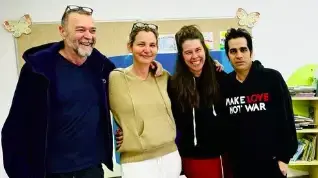When the music can save / Nir Yahav on "I have a chance"
It's hard for me to forget that moment, in 1997, when I first listened to Avitar Banai's unforgettable debut album.
After a minute and six seconds of instrumental track comes the first song.
"I have a chance," Avitar Banai sang - and my jaw dropped.
In an instant I realized that I had just listened to a masterpiece that might change my life.
This beautiful song - which begins with words, piano and strings and slowly drifts into singing "hoo-hoo-hoo" accompanied by all the instruments - distills Avitar's musical genius and writing talent more than anything else.
This song gave that 17-year-old boy that I was then and those hundreds of thousands who also listened to the song, the chance to be saved, the chance that this oppressive fatigue will pass and the light will rise.
Music, I realized then, can save, calm, comfort, strengthen.
"I have a chance" was and still is Banai's greatest anthem, and it is not appropriate for this song to start at that time, 26 years ago, a huge and wonderful career.
The most significant title / Hilleli Spanzer for "You are quiet"
In the songs of Avitar Banai, love is silence.
When he is angry with his love, she is far from being a little quiet for him;
Thirsty for his love, he seeks to relax and rest with her.
Over the years, the object of Avitar's love has changed, and the music he creates in her wake has changed along with it.
In the first and boyish album he is angry about a lost love and looking for the next one;
In the second album, "Journey Song", he is confused and insomniac, bringing love into him only quietly, like the air, through the window.
Then, after years, came "standing on paper".
In his more stable and mature album, Avitar sings about love and crowns it with the most meaningful title for him: quiet.
In "You are quiet" he makes even the biggest cynics fall in love with "an old book / black and white letters";
He brings us into his physical world in a last and nostalgic home, and makes him feel marginal compared to the powerful silence that love gives him.
At Avitar Banai, it doesn't matter if the object is a woman or a Torah scroll.
He will always write about what he loves in the most genuine and open way, and will put anyone who wants to listen into his silence.
The soundtrack of the most Israeli genre / Avner Shavit on "Fathers and Sons"
Without necessarily intending it, Avitar Banai's songs conduct a dialogue with Israeli cinema.
"I put powder on me" predicted and summarizes the plot of Rama Burstein's "Go through the wall", even if he doesn't play it.
"Fathers and Sons", on the other hand, also appears in Yosef Sider's "Beaufort", and stands at the center of one of its highlights, in which one of the soldiers sings the song to his comrades.
It was a rare case in which the soundtrack of a contemporary Israeli film made significant use of an existing song, and an even rarer case of a song whose status in our public opinion was further strengthened thanks to cinema.
Everyone remembers "Beaufort", but not everyone remembers that "Fathers and Sons" also appeared on the soundtrack of "November 08", the film of the great documentarist Daniel Sivan, who is also engaged in military service.
And so, and again without intending to, the song became the soundtrack of the most Israeli genre of all - "shooting and crying".
More in Walla!
How Yossi
To the full article
The friend who went through all the holes with me / Yifat Sani on "A night on a day like Yair"
I discovered Avitar Banai when I was the exact age to dedicate myself to his first album.
I hated like in a Russian theater and was depressed enough to sing "I have a chance" as the anthem.
The years passed, Avitar Banai changed and balanced, and so did I.
I was in a better place, more balanced, less depressed.
Life was less turbulent and more settled and settled.
And then, as always happens - life took an unexpected turn, and difficulties reared their heads.
I was in the hole again.
I was no longer a girl, and I no longer liked this melancholy pose, it scared me to be down again.
Then, as at every other point in my life, a song by Avitar Banai hit me like a precise arrow straight to the heart - "At least there is a battle here, at least there is water, once there was only a pit".
This sentence gave me hope at a time when I couldn't lift my head.
I suddenly realized that as long as there is a struggle between two forces, I'm fine.
I realized that I can be happy in the fact that there is water, not just a pit, even if right now it's hard for me to see it.
I heard "Lila Yogem Yair" over and over at that time, and this mantra managed to reach my heart, it penetrated all the cynicism and depression, and gave me something to hold on to.
When I was 17, Avitar Banai was part of my inner voice, and it remains so to this day.
He is the friend who went through all the ignorance with me, the complex relationships with the family, with the faith and especially with myself.
He was always there, a bit like the house he always sang about: "Along the stream that flows in me from among the trees stands my house".
The city is only one side of the narrow bridge / Amit Salonim on "Tel Aviv"
It is difficult to determine which is the most Tel Aviv song written by Avitar Banai, in his early incarnation as a secular prince.
In contrast, it can be argued that he gave his most religious song the deceptive name: "Tel Aviv".
It is not necessarily a religious song, although it clearly quotes the most beautiful line from the Bible - but it is a song that seeks to deal with the difficulties of repentance in the most honest way possible.
Four years after the words "I'm fighting again" from the song "Lila Yogem Yair", a song that describes the battle between the two worlds, came a kind of circular correction that begins with the words "I'm in Tel Aviv again", a city that perhaps represents the same war.
The recurring word "again" reminds us of the Kabbalistic concept from the book of creation: "And if your heart runs again to a place", which describes the process of emptying and returning to reality.
Tel Aviv demands from Abitar to return to the lower place, in the face of running up and to adhere to the Creator of the world.
The city is one side of the (very narrow) bridge on which a builder walks in his life's journey.
On the other side of the bridge is the faith represented in the poem by his convert wife, Ruth, who in the Bible represents the ultimate grace.
In the song, she symbolizes stability, love, the one that is separated from her only in death.
Is there a safe anchor than that?
This is a song that can be interpreted in several different ways.
The repeated chorus that begins with the words "I probably still don't fully believe" is surprising every time, especially when you listen to it with secular ears that recognize every shred of doubt in faith (including one's own) as a weakness.
But the builder is already on the other side of the bridge when he reveals it to us.
He is familiar with the teachings of the old rebbe who stated that "to be considered again is the purpose of creation". Every few years Banai returns to remind us of his purpose: to make music that no one else does. The kind that penetrates inside, the kind that you have to stop and listen to. One that you can learn from.
Even a modest moon can drive away the darkness / Ido Yeshayahu on "a drop of light"
"Standing on Paper" is a sort of seam album in Avitar's discography.
After the creative and very successful debut came "Journey Song", which was much more experimental and portrayed an artist and a person who is looking for his way.
In the third album, on the cover of which he is photographed with a large bright cap on his head, it is evident that he found some of the peace that he was obviously looking for in the first two albums.
In itself there was great beauty in that.
The lyrics on the album are full of Hasidic references to the banishment of darkness, and of course there is no more striking example of this than "Tipah Shel Or".
Avitar, who got married during the production of the album, wrote and composed the song so simply and so beautifully.
"It's all true, I admit guilt / Loneliness, fornication, failure, success / Fears and jealousy, forgetfulness," he sings, but knows that even a modest moon will drive away the darkness with a drop of light, and his dream is attainable - children playing in a tent in the living room.
In general, the song walks the line between darkness and light in subconscious ways, such as the way in which he expresses "it will come, it will come, it will come" in two different ways, when at first it sounds like "he is hallucinating" and then like what he is actually saying.
Everything comes together to mark the continuation of his musical path also in the new path: the honesty, the exposure and the struggles are still here, only this time I will be more complete, calmer and softer, which is no less beautiful than before.
More in Walla!
Hi Yudko, happy birthday: 70 years of Polikar, 7 songs we will not forget
To the full article
The song that gave up the hints / Dror Zamir on "Bereshit"
Two years after one of the best debut albums to come out in Israel, Avitar Banai released "Shir Tilal", his second album, towards the end of the millennium.
Everyone was waiting for the young builder's voice, along with the piano that had accompanied him until now - but "Journey Song" opens in a completely different style.
First comes an electronic piece, without words, that combines ambient with drum and bass.
It is also separate and completely different stylistically from the song that follows it - "Bereshit", which is served with an acoustic guitar that details a reggae rhythm.
Avitar Banai was never known as a political person.
Certainly not compared to others from the Banai family, such as Orna, Ehud or Gavri, who did not hide their opinions over the years.
Even when Avitar, with his usually personal writing, touched on the protest - he submitted it implicitly.
In "Genesis", written while the country was still battered and bruised by Rabin's murder, he left no room for imagination.
If at the beginning of the song he directs with lines like "quietly in the moonlight, we are a generation that kills", or "the national believer, a nationalist terrorist", later there is no doubt: "The last king was murdered before the end of the century, and the smiling killer studied Torah at Bar Ilan", shouts Banai as hard as he can.
In the middle comes the decisive line: "I don't believe that peace will come as long as there is God every night on television."
But "Genesis" is not only a political poem, but also reveals to us Avitar Banai who begins to ask questions about spirituality, religion and searching for direction.
The song opens with the line "In the beginning man created faith", continues with "the days pass me by and I feel that it helps me to escape, to forget everything, to start another family".
Towards the end, he echoes several times that "there is no question, there is no answer".
For his next album, released six years later, he already arrived with a new family, a big cap on his head - and an answer.
The never-ending race / Schleider-Putschnik string on "Pergola"
Just as Magritte's pipe is not a pipe, Banai's pergola is not a pergola either.
Or at least not only.
The song released in 2017 on the album "Tongues of Ash" is the essence of the crisis of the previous decade in Banai's life.
That moment that comes around the age of 40 when you go through the checklist of life, and instead of being happy with what you have - you are busy with what you can lose, and for moments you ask yourself (and yourself), why am I in this race at all?
It's not for nothing that Banai begins the passage through his checklist with the imperative statement: "I have something to lose."
All his young life, a person works to achieve success, status, money, a 130 square meter house, a permanent place in the synagogue and not one pergola, if not two - it almost reminds me of the tortilla bush of a great land: "And whoever can afford it - I recommend it" But when he has all of these, instead of enjoying them, he is only busy holding on to them so they don't lose (and maybe he himself won't lose). And there is also the competition - it's the drive that burns inside ("I can't lose, just let them overtake") And the status symbols of the bourgeoisie (the kosher sushi, circularly pruned trees, and that "I'll bring wine" that we all end up saying at some point in our lives) and the spiritual-religious obligations and the burden of the mitzvot that he took upon himself. And underneath all of this is slavery to the body and fear, an abyss without exploration and doubt, a questionable offer A plea to put all of these down and withdraw from this race: "Come out, let's go out."
I had to stop the car on the side / Yaniv Granot on "Beg me"
Long before Shazam would make this operation easier and less magical, I had to pull the car over, wait for the song to end, and cross my fingers that the radio would say what (and who) just happened.
The amount of years that have passed since that afternoon is shockingly high, but I still remember everything perfectly, one by one, gear by gear - the piano slowed me down, the voice almost stopped me and the harsh world finally took over my steering wheel, leading the situation towards an empty bay of a bus station Rika, on Friday Rika, added.
I didn't know then how to distinguish between violence and nerves, mercy and indulgences.
Even less than that I knew how to be happy, and the broken heart of a high school student is anyway the most broken heart in the world.
But when the song ended, I knew that Avitar Banai had promised that I could do it, and I knew that I could continue traveling.
More in Walla!
A miracle's distance from here: Avitar Banai returned to the first album, and it's even more beautiful than we remembered
To the full article
The paradoxical contrast that changes everything / David Rosenthal on "Dog Competition"
Sometimes the attitude towards an artist changes following a process, and sometimes it happens thanks to just one song.
I have to admit that I didn't connect with Avitar Banai at first, and by "in the beginning" I mean for almost a decade.
Something didn't stick in his melancholic anarchism, until the wonderful "Dog Contest" came along.
Not surprisingly, behind the lyrics of this song was also Amir Lev, whose melancholic and soulful rock burned hearts in the nineties, but it would be an injustice to take away from Banai the credit for the warning sense of loneliness he conveys.
It is difficult to separate from the song the clip in which a builder drives a taxi, surrounded by broken people and feeling alone.
This is the essence - to be in a company and feel naked, a deep contrast that is expressed through such beautiful essays as "In the beautiful shoes I run barefoot", "Riding in a taxi, not remembering the address", "Directing the traffic without knowing where".
Banai describes well a feeling of circularity, of helplessness and inability to get out of the loop.
Even "I'm already coming, I'm already there", apparently two steps in one process, can be seen as a kind of paradox, of frenzy that leads nowhere.
There were quite a few creators who sang about unrequited love, breakups and heartbreak.
In the case of a builder, his conflict is with himself.
always was.
In "Dog Race" he reached his peak and almost forced a re-evaluation of everything he had done up until then - and since then.
The poetic description of human loneliness / Sagi Ben Nun on "I put powder on me"
He performed this classic, from Banai's debut album, with the singer and actress Efrat Ben Tzur.
It was the only song from that album that he did not write himself - but a section from Uri Sela's Hebrew version of the children's book "Mama Goose", based on the collection of practical stories written by the writer Charles Perrault and published in Paris at the end of the 17th century.
In the same way that this collection of practicalities inspired many generations, Avitar Banai filled Israeli music with tremendous inspiration.
In the 25 years that have passed since the 25-year-old builder released it, this song has not lost its charm.
It still vibrates the heart with words that combine childishness with pain, with a melody that brings a disco groove, and with the precise production and arrangement of Assaf Amdorski.
The song brought to mind the wonderful Ben Tzur, who was Banai's girlfriend at the time.
There is an untrue story, published in several places, according to which the song came to Banai after it was used as a game exercise for Ben Tzur and he happened to notice it on the table in their apartment.
Ben Tzur claimed that the DM. On the other hand, another common story is actually true: that the song on the next track of the same album, "Russian Theater", which was written by Banai and includes the harsh words "I am angry and hope that you fail" - was written about Ben Tzur. The relationship between the two is known to be not led to the wedding, but the line "Now all that is needed is for the groom to come" can correspond nicely with the play "The Bride and the Butterfly Hunt" by Nissim Aloni, which in the last two years won an excellent version of the Gesher Theater starring... Efrat Ben Tzur. The poetic description of human loneliness remains eternal in both works These big ones.
Let change grow / Nadav Menuhin on "Gifts"
Avitar Banai is one of Israel's favorite writers when it comes to questions of love and faith, but if I had to choose one question that screams from his art, it is "how do you get out of this", where by this word is meant confusion, numbness, depression, loss of direction, restlessness - and if we add the next step to this: how do you grow from this place to security, stability, acceptance and self-love.
Banai returns to this problem again and again, which perhaps explains why even in a society that is split and divided on almost every issue, it is still a cross-sector consensus.
So how do you find a golden ladder from the edge of a pit?
It's a chaotic place, and Banai's poems are like that too: long sentences, free of frames, led by poetry that follows its own rules.
The mess gives birth to beauty, but does this beauty bring the answer or deepen it?
"Gifts" embodies the struggle.
From the moment the drums start running and hitting in every direction without a break, the harmonica and the guitars and his own voice all go into high gear.
There are not many words there, there is no regular rhyme, only mantras, self-promises, attempts to fulfill them - and a longing for love, and giving.
The highest level, the greatest ambition, is to give to others.
And for that we have to get out of the pit.
Six words in all that make up the refrain of "Gifts" - "Let the change grow, don't be afraid of the fear" - have long since become a symbol.
But they cannot be separated from the special form in which a builder wails over them, cries over them, prays with them, struggles with them until he merges with them.
This is the heart of the matter: pit, ladder, struggle, faith, completion.
On the other side of the song, countless listeners were able to grow along with him.
That's how Banai managed, after all, to distribute gifts to everyone.
culture
music
Israeli music
Tags
Avitar Banai









